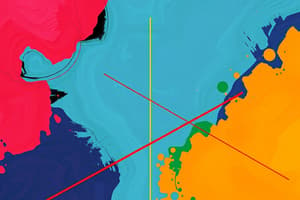Podcast
Questions and Answers
According to economics, scarcity means that people face trade offs because
According to economics, scarcity means that people face trade offs because
- people have unlimited wants
- people have limited wants
- resources are unlimited
- resources are limited (correct)
Which of the following is NOT one of the 8 principles of economic thinking?
Which of the following is NOT one of the 8 principles of economic thinking?
- People respond to incentives
- Opportunity cost exists
- Scarcity exists (correct)
- Rational decisions are made at the margin
What is the role of government in improving market outcomes?
What is the role of government in improving market outcomes?
- To support people's standard of living
- To ensure voluntary exchange happens
- To make markets good until they are not (correct)
- To allocate factors of production
Which of the following is NOT a factor of production?
Which of the following is NOT a factor of production?
What is the difference between microeconomics and macroeconomics?
What is the difference between microeconomics and macroeconomics?
Which one of the following is a factor of production?
Which one of the following is a factor of production?
What is the role of voluntary exchange in economics?
What is the role of voluntary exchange in economics?
What is the relationship between scarcity and trade-offs?
What is the relationship between scarcity and trade-offs?
What is the meaning of rational decisions at the margin?
What is the meaning of rational decisions at the margin?
What is the main focus of microeconomics?
What is the main focus of microeconomics?
Flashcards
Scarcity
Scarcity
Scarcity refers to limited resources necessitating trade-offs in decision-making.
Trade-Offs
Trade-Offs
Trade-offs involve forgoing one option for another due to resource constraints.
Opportunity Cost
Opportunity Cost
Opportunity cost is the value of the next best alternative forgone when making a decision.
Role of Government
Role of Government
Signup and view all the flashcards
Factors of Production
Factors of Production
Signup and view all the flashcards
Microeconomics
Microeconomics
Signup and view all the flashcards
Macroeconomics
Macroeconomics
Signup and view all the flashcards
Voluntary Exchange
Voluntary Exchange
Signup and view all the flashcards
Rational Decisions at the Margin
Rational Decisions at the Margin
Signup and view all the flashcards
Scarcity and Trade-offs Relationship
Scarcity and Trade-offs Relationship
Signup and view all the flashcards
Study Notes
Scarcity and Trade-offs
- Scarcity implies limited resources, necessitating trade-offs when making choices.
- Every decision typically involves forgoing one option for another due to resource constraints.
Principles of Economic Thinking
- Eight key principles guide economic thinking, including trade-offs, opportunity costs, and the role of incentives.
- Familiarity with these principles can enhance understanding of economic behavior.
Role of Government in Market Outcomes
- Government can intervene to correct market failures, providing public goods and regulating monopolies.
- Policies may aim to improve efficiency and ensure equitable distribution of resources.
Factors of Production
- Factors of production include land, labor, capital, and entrepreneurship.
- Elements such as technology are often considered associated factors but not direct inputs.
Microeconomics vs. Macroeconomics
- Microeconomics focuses on individual economic agents (consumers, firms) and their decisions.
- Macroeconomics examines aggregate economic phenomena like inflation, unemployment, and national output.
Voluntary Exchange in Economics
- Voluntary exchange facilitates trade between parties, benefiting both through the realization of comparative advantages.
- It fosters efficiency and encourages a diverse range of goods and services in the market.
Scarcity and Trade-offs Relationship
- Scarcity leads to the necessity of trade-offs, as not all wants can be fulfilled.
- Understanding this relationship helps economists predict consumer behavior and market dynamics.
Rational Decisions at the Margin
- Rational decision-making at the margin involves weighing additional benefits against additional costs for each choice.
- Decisions are made by evaluating the incremental impacts rather than total outcomes.
Focus of Microeconomics
- The main focus of microeconomics is investigating how individuals and businesses make decisions regarding resource allocation.
- It includes concepts such as supply and demand, price formation, and consumer behavior.
Studying That Suits You
Use AI to generate personalized quizzes and flashcards to suit your learning preferences.




